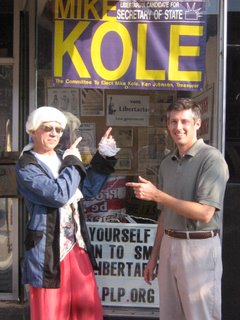Election Follies, Part TenSecretary of State is Indiana's ballot status race. For any political party, their candidate for Secretary of State must earn at least 2% to win automatic ballot access for the following four years. Automatic ballot access is important, for it means the parties are spared the need for petitioning in order for its' candidates to appear on the ballot.
Petitioning is expensive, and frankly, not very fulfilling. It's a lot of work, and you really aren't getting to talk about your issues. Ballot access was valued at $80,000 by Brad Klopfenstein when he was Executive Director of the Libertarian Party of Indiana. He made his estimate on a purely paid petitioning effort. We can ask Bill Stant and the Greens what its' value is.
I am the Libertarian candidate for Indiana Secretary of State. I am running for many reasons. Among them is for continued Libertarian automatic ballot access. I want to make sure Libertarian candidates go straight to talking issues, passing petitioning. If this is important to you, please
donate via this link today.
There are other ballot status thresholds that are tied to a party's outcome in the Secretary of State race, such as Major Party and Minor Party status. A political party is declared a Major Party when its' candidate for SOS earns at least 10%.
Major Parties particpate in the primary elections. Major Parties have representatives on the Indiana Elections Commission. Minor Parties are excluded from the primaries and the Elections Commission.
Obviously, being represented on the Elections Commission is a big deal. The Commission decides how rigorously enforce Indiana Code and impose fines. If your party isn't on the Commission, you have to worry if you get hauled before them.
The Republicans and Democrats use the Primary Elections to find out who their likely true-blue (or true-red) supporters are. Indiana is not a registration state, where voters declare their political affiliation. I wish it were. I would know who all these people who vote Libertarian are, and I could communicate with them directly. Rs & Ds communicate directly with those voters who take a partisan 'R' or 'D' ballot at the Primary. Nice little advantage they have created for themselves, but it isn't just bad for Indiana's Minor Parties.
It's bad for the voters. Most voters are not partisans. They're independents. They scratch vote across the three parties. When campaigning, I hear a great many tell me that they vote for the best candidate and not the party. I believe them. So, this majority is fairly alienated by a Primary Election that requires the voter to take only either a partisan 'R' or 'D' ballot, the act of which is a declaration that, under threat of perjury, the voter intends to cast the majority of their votes for that same party in the November General Election.
Scratch voters haven't made up their minds in May. They are waiting to see the character of the candidates emerge on the trail. They stay away from the polls in May. Here's the proof: The
turnout in 2006 for the Primary was merely 19% statewide. That's 19% of registered voters, not of eligible adult citizens. That's embarrassing.
It's time for the General Assembly to look at the mechanics of the partisan ballot. It's time to eliminate the perjury clause. It's time to make voter information available to all parties, by making Indiana a registration state.
It's also time to re-evaluate what it means to be a Major Party statewide in Indiana.
I believe that a Major Party is one that fully participates in the elections statewide. A Major Party should therefore run a candidate in every race that is on the ballot for statewide office, for Federal office, and for Indiana House and Senate. If a party is truly a Major Party, it has the resources and the wherewithal to run a candidate in each of these races, otherwise it is just packing it in and doing a disservice to the voters.
The Indiana Democrats are a joke party if they can't or won't run a candidate for US Senate. They should be stripped of their Major Party status immediately.
To be fair, no party would be a Major Party under my listed criteria, as the gerrymandering of districts has made it so both Democrats and Republicans pack it in for a significant number of Indiana House and Senate Districts. You want to brag on your Major Party status? Give the voters representation in every district. Otherwise, join the Libertarians as Minor Parties.
Libertarians are laughed at when we fail to post candidates for high posts. Very well. Let's now laugh at the Democrats and Republicans, because they are as guilty as anyone.
Major Party status is currently set with the comfort of Republicans and Democrats in mind, and discomfort for the Libertarians and all other parties similarly in mind. That's what happens when election laws are written by Republicans and Democrats. If two oil companies wrote the laws on oil production, distribution, and sale, we would call it collusion. Guess what Indiana election law is?
It is important that we have competitive elections in Indiana. It allows for issues to be vigorously discussed until November instead of until May. It means greater turnout at the polls. It means more people paying attention to what government does. It means more accountable elected officials. In sum, it means a better representative government.
Until Rs & Ds have to work to earn their Major Party status, we will continue to see lazy efforts by them, whereby they surrender 40% of the seats each to one another, and fight over about 20% of them to see who gets the majority in the Indiana House. Until the Indiana Legislature changes the rules to make it tougher on the Rs & Ds, the people of Indiana will continue to be ripped off by those parties, and the voters will stay home.

 Speaking with WIBC 1070-am reporter Eric Berman, outside the Statehouse. From left- Tom Mulcahy, now ex-candidate for House District 96; Kole; Wayne Kirk, Hamilton County vice chair; Kim Brand, now ex-candidate for House District 53; Eric Berman.
Speaking with WIBC 1070-am reporter Eric Berman, outside the Statehouse. From left- Tom Mulcahy, now ex-candidate for House District 96; Kole; Wayne Kirk, Hamilton County vice chair; Kim Brand, now ex-candidate for House District 53; Eric Berman.

